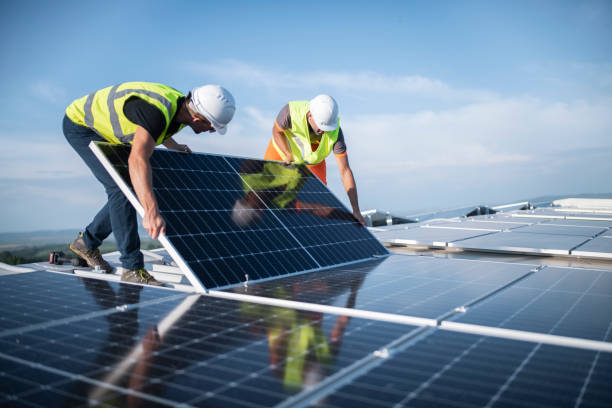Understanding Careers in Solar Panel Installation and Energy
The solar energy sector has experienced remarkable growth in recent years, creating diverse employment opportunities across installation, maintenance, engineering, and sales. As renewable energy becomes increasingly vital to addressing climate challenges, professionals in this field contribute to sustainable infrastructure while building rewarding careers. This article explores the various roles available in solar energy, the skills required, and what daily responsibilities look like for those working with solar technology.

What Types of Careers Exist in the Solar Energy Field?
The solar energy industry encompasses a wide range of career paths that extend far beyond simply installing panels on rooftops. Professionals in this sector work in manufacturing facilities, research laboratories, construction sites, corporate offices, and customer service centers. Technical roles include solar photovoltaic installers, electricians specializing in renewable systems, and energy auditors who assess buildings for solar potential. Engineering positions involve designing solar arrays, developing new photovoltaic technologies, and optimizing energy storage solutions. Sales representatives educate customers about solar benefits and financing options, while project managers coordinate installations from initial assessment through final inspection. The diversity of roles means individuals with backgrounds in construction, engineering, business, or environmental science can find suitable positions within the industry.
What Are the Key Roles and Responsibilities in Solar Panel Installation?
Solar panel installation requires a coordinated team effort involving multiple specialized roles. Site assessors visit properties to evaluate roof conditions, sun exposure, and structural integrity before projects begin. They measure dimensions, photograph locations, and identify potential obstacles like chimneys or trees that might create shading issues. Installation crews typically include lead installers who supervise the work, journeyman installers who handle physical mounting and wiring, and apprentices learning the trade. These teams secure mounting hardware to roofs or ground structures, carefully position panels for optimal sun exposure, and connect electrical components according to local codes. Electricians integrate solar systems with existing electrical infrastructure, installing inverters that convert direct current from panels into usable alternating current for homes and businesses. Inspectors verify that completed installations meet safety standards and building regulations before systems can be activated.
What Skills and Training Do Solar Energy Workers Need?
Entry into solar energy careers typically requires a combination of technical knowledge, physical capability, and safety awareness. Many installers begin with backgrounds in construction, roofing, or electrical work, bringing transferable skills to solar-specific applications. Vocational schools and community colleges offer certificate programs covering photovoltaic system design, electrical theory, and installation techniques. These programs often include hands-on training with actual solar equipment and may prepare students for industry certifications. The North American Board of Certified Energy Practitioners offers credentials that demonstrate professional competency and are valued by employers. Workers must understand building codes, electrical safety protocols, and proper use of tools ranging from power drills to voltage meters. Physical fitness is important since installers frequently work on roofs, lift heavy equipment, and spend extended periods outdoors in various weather conditions. Problem-solving abilities help teams adapt when unexpected challenges arise during installations.
What Does a Typical Day Look Like for Solar Energy Professionals?
Daily routines vary significantly depending on specific roles within the solar industry. Installation crews typically start early, gathering at a shop or warehouse to load equipment and review the day’s work orders. They travel to job sites where they may spend several days completing a single residential installation or weeks on larger commercial projects. Mornings often involve setting up safety equipment like harnesses and scaffolding before beginning physical work. Throughout the day, installers drill mounting points, run conduit for wiring, position panels, and make electrical connections. Frequent communication occurs between team members and with project managers who coordinate schedules and address customer questions. Engineers and designers spend more time in office environments using specialized software to model solar systems, calculate energy production estimates, and prepare technical drawings. Sales professionals meet with potential customers, conduct property assessments, and prepare proposals outlining system costs and projected savings. Regardless of role, attention to detail and commitment to quality workmanship remain constant priorities.
What Career Growth Opportunities Exist in Solar Energy?
The solar industry offers clear advancement pathways for motivated professionals. Entry-level installers can progress to lead installer positions, taking on supervisory responsibilities and mentoring newer team members. With additional training and experience, some move into project management roles overseeing multiple installation crews and coordinating complex commercial projects. Technical specialists may focus on system maintenance and troubleshooting, becoming experts in diagnosing and repairing solar equipment. Those interested in business aspects can transition into sales, customer service, or operations management. Engineers may advance from junior design roles to senior positions developing innovative technologies or managing research initiatives. The expanding nature of the industry means companies frequently promote from within, valuing employees who demonstrate reliability, technical competence, and commitment to safety. Continuing education through workshops, certifications, and industry conferences helps professionals stay current with evolving technologies and best practices.
How Is the Solar Energy Workforce Evolving?
The solar energy workforce continues to diversify and expand as the industry matures. Increased awareness of climate issues and supportive policies have accelerated solar adoption, creating sustained demand for skilled workers. Companies are investing in training programs to develop talent pipelines, recognizing that workforce development is essential for meeting growing installation demands. The industry increasingly emphasizes safety culture, with comprehensive training programs addressing fall protection, electrical hazards, and heat-related illnesses. Technology advancements are changing job requirements, with installers now working with more efficient panels, sophisticated monitoring systems, and integrated battery storage solutions. Remote monitoring capabilities allow technicians to diagnose system issues without always visiting sites physically. The workforce is also becoming more inclusive, with initiatives aimed at recruiting women and underrepresented minorities into technical roles. As solar technology becomes more mainstream, career stability in the sector improves, offering long-term employment prospects for those entering the field.
The solar energy sector provides meaningful career opportunities for individuals interested in contributing to environmental sustainability while developing valuable technical skills. From hands-on installation work to engineering innovation and customer education, diverse roles suit various interests and abilities. As renewable energy continues expanding its share of the power generation market, professionals in solar energy can expect ongoing demand for their expertise and opportunities for career advancement.




